Basalt lined pipes
for Japanese steel plants
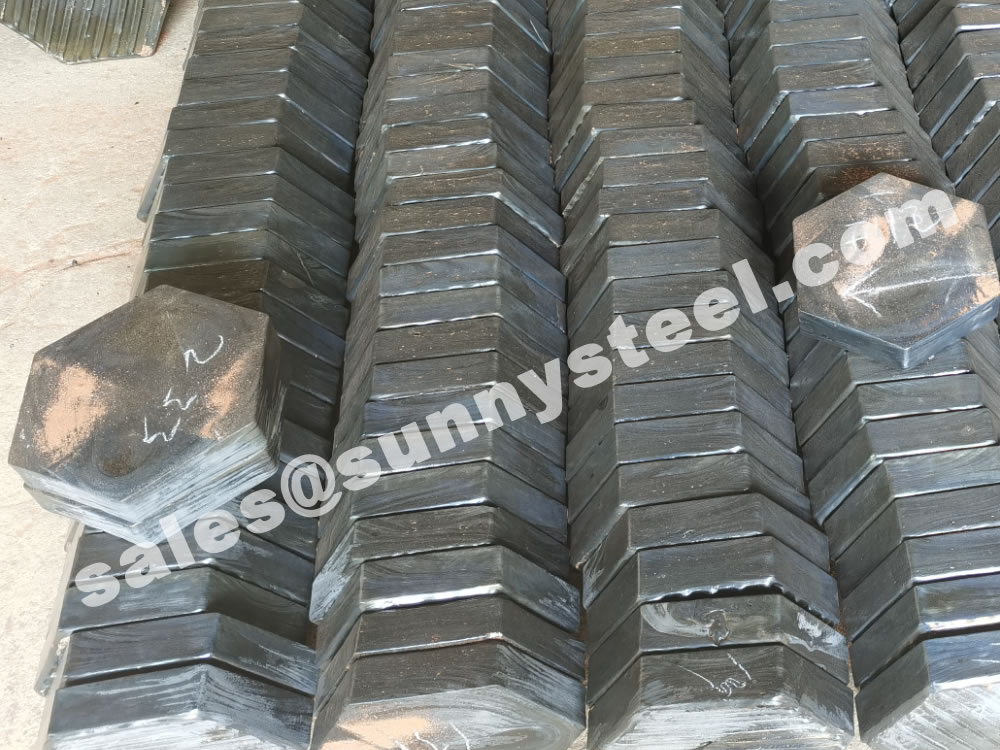
Hexagonal cast basalt slate is one type of cast basalt tile that is made of natural basalt stone.
Download PDFThe Hexagonal Cast Basalt Slate is an advanced material solution known for its extreme durability and wear resistance, making it perfect for industrial applications. Its unique hexagonal shape provides enhanced coverage and interlocking capability, ideal for environments exposed to heavy wear and abrasion.
Hexagonal cast basalt slate is a type of cast basalt tile made from natural basalt stone. It is formed by melting basalt rock at a temperature of more than 1200°C and then casting it into molds in a hexagonal shape.
Hexagonal cast basalt slate is used in various industries such as mining, construction, and transportation. It is ideal for lining pipework, chutes, bunkers, cyclones, and hoppers. Common applications include:
Hexagonal cast basalt slate is a durable and cost-effective material suitable for a wide range of industrial applications where high wear resistance, chemical resistance, and thermal stability are required.
In terms of maintenance, the hexagonal cast stone slabs' resistance to pollution and ease of cleaning make their maintenance costs relatively low. Due to their high surface hardness and resistance to scratches, they can be maintained in good condition and functionality with simple cleaning during daily use. Additionally, the durability and anti-aging properties of hexagonal cast stone slabs mean that their maintenance cycles can be long, further reducing long-term operating costs.
However, the limitation of hexagonal cast stone slabs lies in their sensitivity to impact. Although they are hard, they may experience brittle fracture under severe impacts. Therefore, appropriate buffering and protective measures need to be considered in design and construction to mitigate this risk. Moreover, due to their heavy weight, special support structures may be required for certain applications.
Despite these limitations, the comprehensive performance of hexagonal cast stone slabs makes them a preferred material in many industrial applications.
Hexagonal cast basalt slate is formed by melting basalt rock at a temperature of more than 1200°C and then casting it into molds in a hexagonal shape.
The unique hexagonal shape of this type of cast basalt tile provides a strong and durable surface that is ideal for use in a range of applications, including flooring, cladding, and paving. It can also be used in areas where high resistance to wear, chemical corrosion, and extreme temperatures is required.
Hexagonal cast basalt slate is known for its exceptional hardness, low water absorption, and resistance to abrasion and damage. It is also non-toxic, non-flammable and has excellent insulating properties. Due to these qualities, it is suitable for use in a variety of industries, such as mining, construction, and transportation.
In addition, hexagonal cast basalt slate is available in a range of colors and sizes, making it easy to customize to fit specific project requirements. It is also easy to maintain and clean, making it a practical and cost-effective solution for a wide variety of applications.
Hexagonal cast basalt slate is a versatile material that can be used in a variety of applications. Its durability and natural texture make it ideal for exterior cladding, paving, and landscaping projects. Its hexagonal shape creates an attractive and modern pattern that can be used on floors, walls, and even ceilings.
In commercial settings, hexagonal cast basalt slate can be used in high traffic areas such as lobbies, corridors, and atriums. It is also commonly used in retail spaces and restaurants to provide a unique and inviting atmosphere. The natural texture of the slate also provides slip resistance, making it ideal for outdoor walkways and pool areas.
In residential settings, hexagonal cast basalt slate can be used in both indoor and outdoor areas. It is commonly used for patio flooring, pool surrounds, and garden pathways. Its natural texture and color also make it a popular choice for accent walls and fireplace surrounds.
Overall, hexagonal cast basalt slate is a versatile and durable material that can be used in a variety of applications. Its natural beauty and unique texture make it a popular choice for both commercial and residential projects.
| Cast Basalt Pipe DN (mm) |
Standard Steel Pipe OD (mm) |
Cast Basalt Thickness (mm) |
Length (mm) |
|---|---|---|---|
| 80 | 159 | 25 | 4000 |
| 100 | 168 |
17.5 20 |
4000 6000 8000 |
| 125 | 195 | ||
| 150 | 219 | ||
| 175 | 245 |
6000 8000 10000 12000 |
|
| 200 | 273 | ||
| 225 | 300 | ||
| 250 | 325 | ||
| 275 | 345 | ||
| 300 | 377 | ||
| 350 | 426 | ||
| 400 | 478 |
20 25 |
|
| 450 | 529 | ||
| 500 | 600 | 25 | |
| 550 | 650 | ||
| 600 | 720 | 30 | 6000 |
| 650 | 770 | ||
| 700 | 820 | ||
| 750 | 870 | ||
| 800 | 920 |
Other specifications of cast steel pipe lined with basalt can be manufactured according to customer technical requirements. Suitable for large-diameter basalt lining steel pipes with a nominal diameter greater than 800mm. Generally, according to the running status of the pipeline, different cement is used to fix the basalt brick inside the finished steel pipe to complete the basalt lining steel pipe. Its advantages are good wear resistance, wide range of use, basically not limited by the size of the pipeline and low cost of pipeline installation.
Comparison of Ceramic lines with few other materials under standard conditions :
| Material | Thickness(mm) | Approx life ( Months ) |
|---|---|---|
| Mild Steel | 10 | 3-5 |
| Cast Iron | 20 | 6-8 |
| Ni-Hard | 20 | 12-14 |
| Cast Basalt | 30 | 20-25 |
| Ceramic | 10 | 35-40 |
Hard & Compact Smooth & Inner Withstands High-Abrasion & Corrosion In any of the process industries especially Sled and Cement corrosion and abrasion lead to significant downtime of the plant. Further, the useful life or the equipment itself may get impaired because of the high abrasive nature of the materials being used. Thus, ‘wear mechanism’ results in hut down, replacement, etc., which is costly, resulting in loss to tilt: tunic of millions of dollars.
The bend radius should be minimum 3 times of the nominal bore. At discharge end of each bend, cast basalt lined straight pipe of length 5 to 12 times the nominal bore must be used.
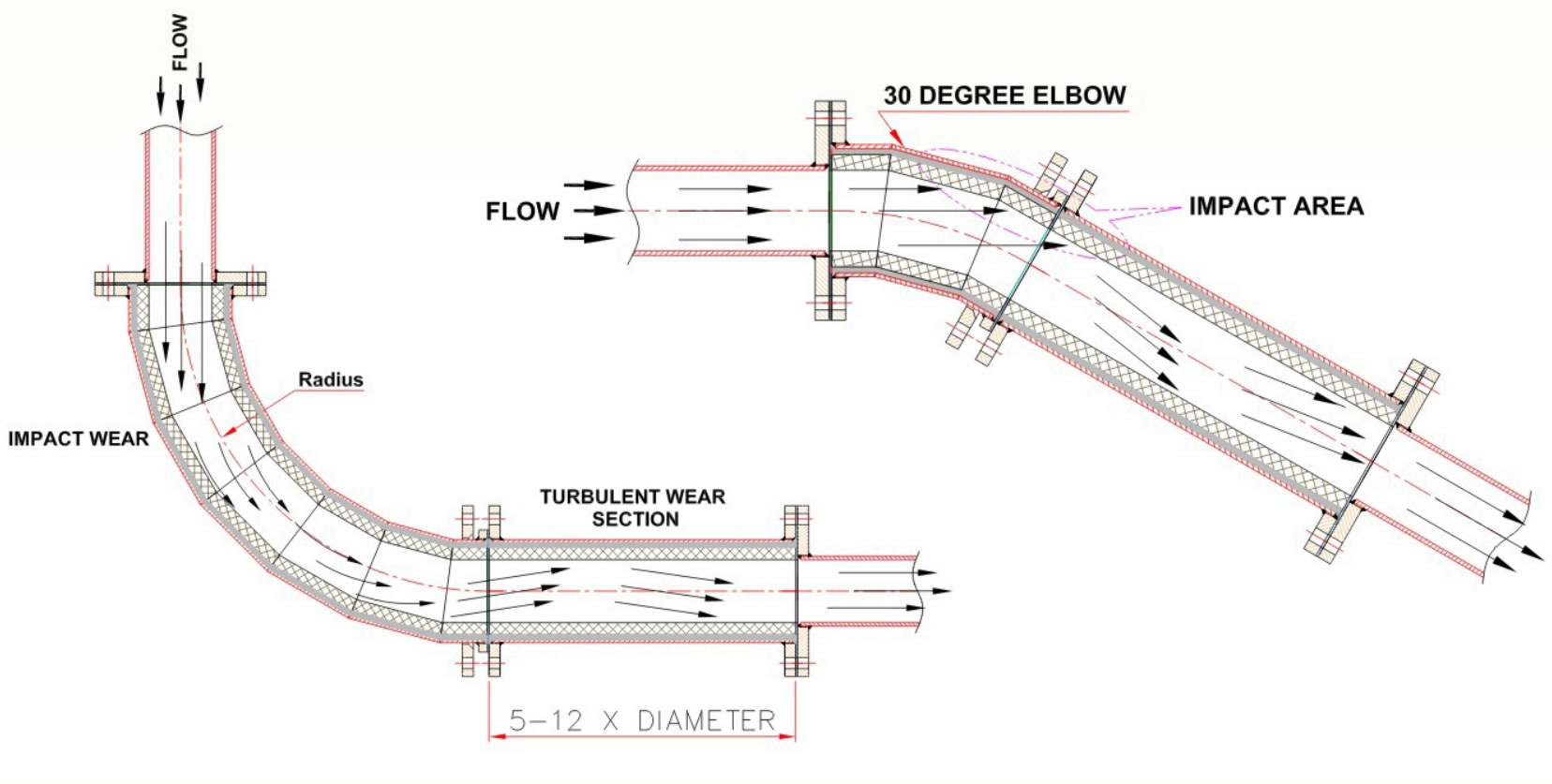
Cast basalt can be used for the lining of pipework, chutes, bunkers, cyclones, and hoppers.
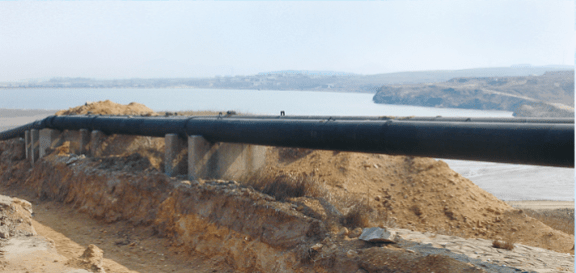
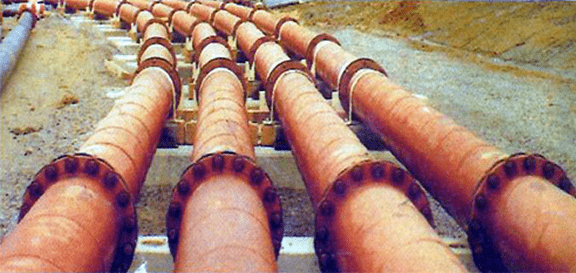
It has become the global standard in areas such as ash slurry pipework, often used at fossil-fuel power stations. It is an all-round cost-effective and adaptable lining material that extends the life of equipment in pipe or tile form where affected by erosion.
Cast basalt is well-proven in a variety of industries as a cost-effective, long-lasting lining material used to extend the operating life of equipment manufactured or lined with lower-wearing materials such as steel, cast iron, rubber, and polyurethane.
Cast basalt lined steel pipe, as both a wear—resistant and corrosion—resistant materials, the transport properties of wear or corrosion of materials, after thirty years of practical verification, cast basalt lined steel pipe can be well done.
Cast basalt is also used in cement plants for making air separators, chain conveyor, silica hoppers, nozzles, coal hoppers, cement hoppers, cyclones, raw mill ducts, chutes, thick slurry lines, mixers, grate cooler housing, coal ventury etc.
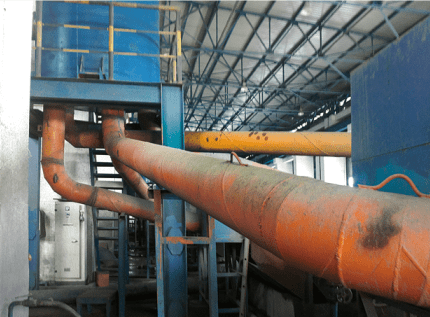
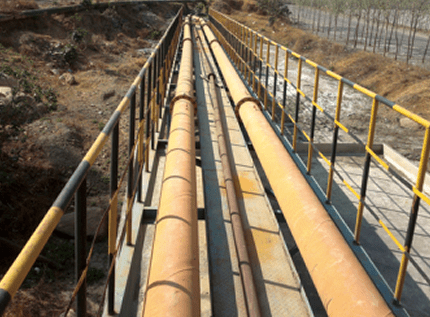
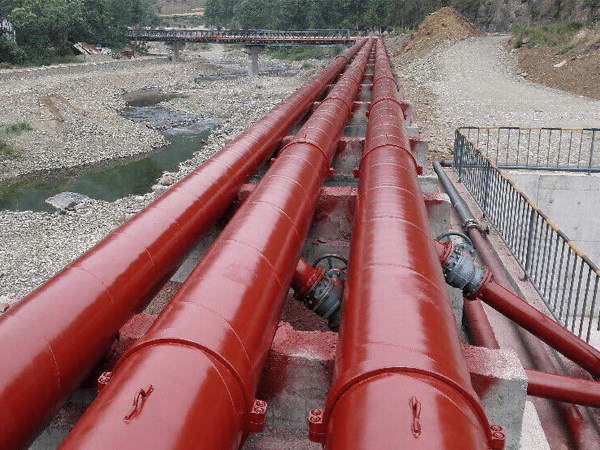
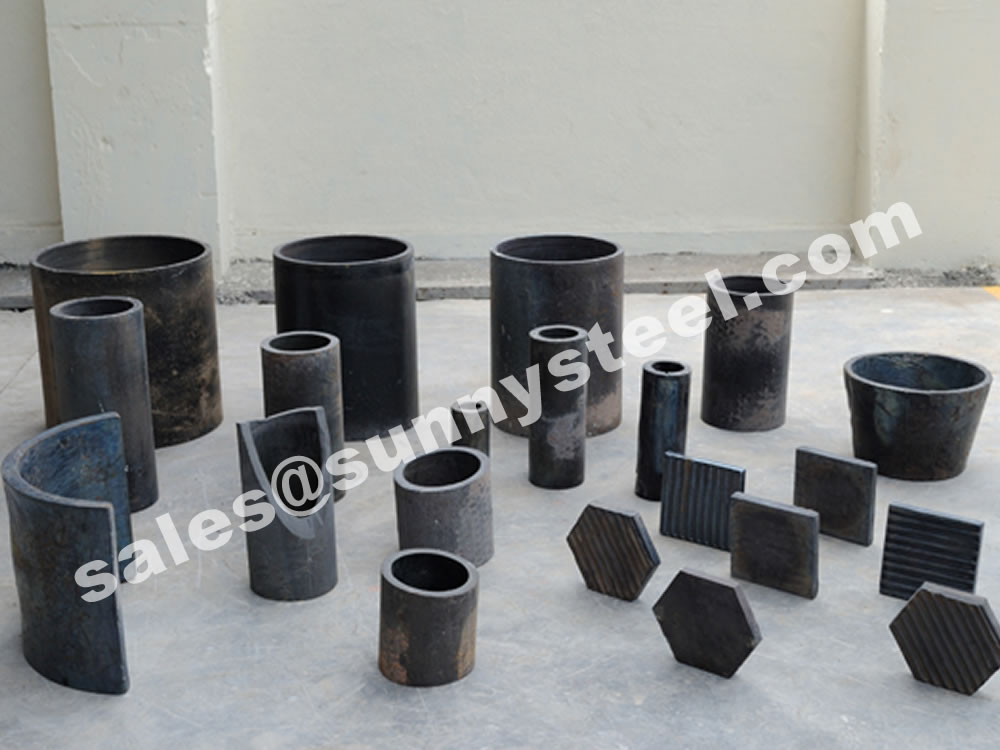
Cast basalt is a mineral of exceptionally high abrasion resistance, unlimted resistance to moisture, high compressive strength and resistance to virtually all acids and alkalis and is completely corrosion free.
Cast basalt is produced by melting selected natural basalt broken into sizes of 20-50 mm in shaft furnaces at tempreatures around 1,300C, following by casting at which the metled basalt forms uniforms pherolithic crystals hence producing its typical physical propertics, in particular its exceptional hardness and wear-resitance.
Cast basalt reaches a value of hardness of 8( min ) on the Moh's hardness scale. for comparision : the highest value10is only attained by dimonds. by virtue of these properties,the silicate cast basalt provides outstanding protection against abrasion and scrubbing.
however, it is marked by asertain sensitivity ti impacts.Under Normal services conditions, cast basalt withstands tempratures up to approx.+ 350C or-40C. However Cast basalt sholud not be subjected ti temprature shocks.
Sizes : Cast basalt produces are manufactured as tiles, from pieces and segments. straight pipes are spun-cast, available for nominal bores of 32 to 600 mm with the wall thickness ranging from 20 to 30mm and a standard lenght of 500mm.samller nominal bores of straight pipes, pipe segment for radill of 40 to 3,000mm of vatrious angles, as well as special formpiece linings are pre dominately sand-cast. The standard wall-thickness is 20mm. depending on the respective quantity, steel moulds can also be used, the wall thickness in those cases usually being 30 to 40mm.
Cast basalt lined pipe can be mainly used as abrasive material and ash handling system like chute slip trough, funnel, silos, a variety dust catcher, revolving-flow machine, various scraper transport planes, all the feeder liner. Laying the ground all types of chemical plants, it can be for lining picking tank or storage of corrosive substance of the storage room.
According to customer requirements along with cast basalt production technology and we can offer various specifications and various shape to meet client's need.
Friction Resistance : As more material is passed over Cast Basalt it gets polished up thereby reducing friction further. Cast Basalt improves in service after getting polished. Wetting also improves its performance in practical applications.
Impact Resistance : Direct Impact Resistance at 90 degree is low like all other ceramics, but it can be increased with proper installation by reducing the angle of impact. Cast Basalt is the best wherever sliding abrasion exists. Moreover, external impact strength of composite basalt pipe (enclosed in M.S. Shell) is always more than that of bare Ni-hard Pipe.
Chemical Resistance : Cast Basalt is almost absolutely acid/alkali resistant (except Hydrofluoric Acid) and hence corrosion resistant.
Weight and Sizes : Basalt Tiles are available in regular shape square of 200 x 200 x 30 mm thick, weighing approx. 90 kg/sq m; whereas bends and pipes are lined using Basalt Cylinders of various standard sizes from 50NB upto 500NB.
Temperature : Cast Basalt withstands temperature up to 4500 oC.
Design Aspects
Refining basalt to a finely crystallised glass ceramic, SunnySteel’s cast basalt wear resistant material provides an extremely durable, long-lasting lining for static plants bearing large volumes of abrasive and/or corrosive matter.
Supplied as both a pipe and tile lining solution, cast basalt is ideally suited for wet material handling applications with lower impacts, such as coal chutes, ash sluiceways, ash pipelines at power stations and hydraulic granulated slag or sand conveying. Basalt delivers high resistance to wear corrosion and temperatures up to approximately 400 °C.
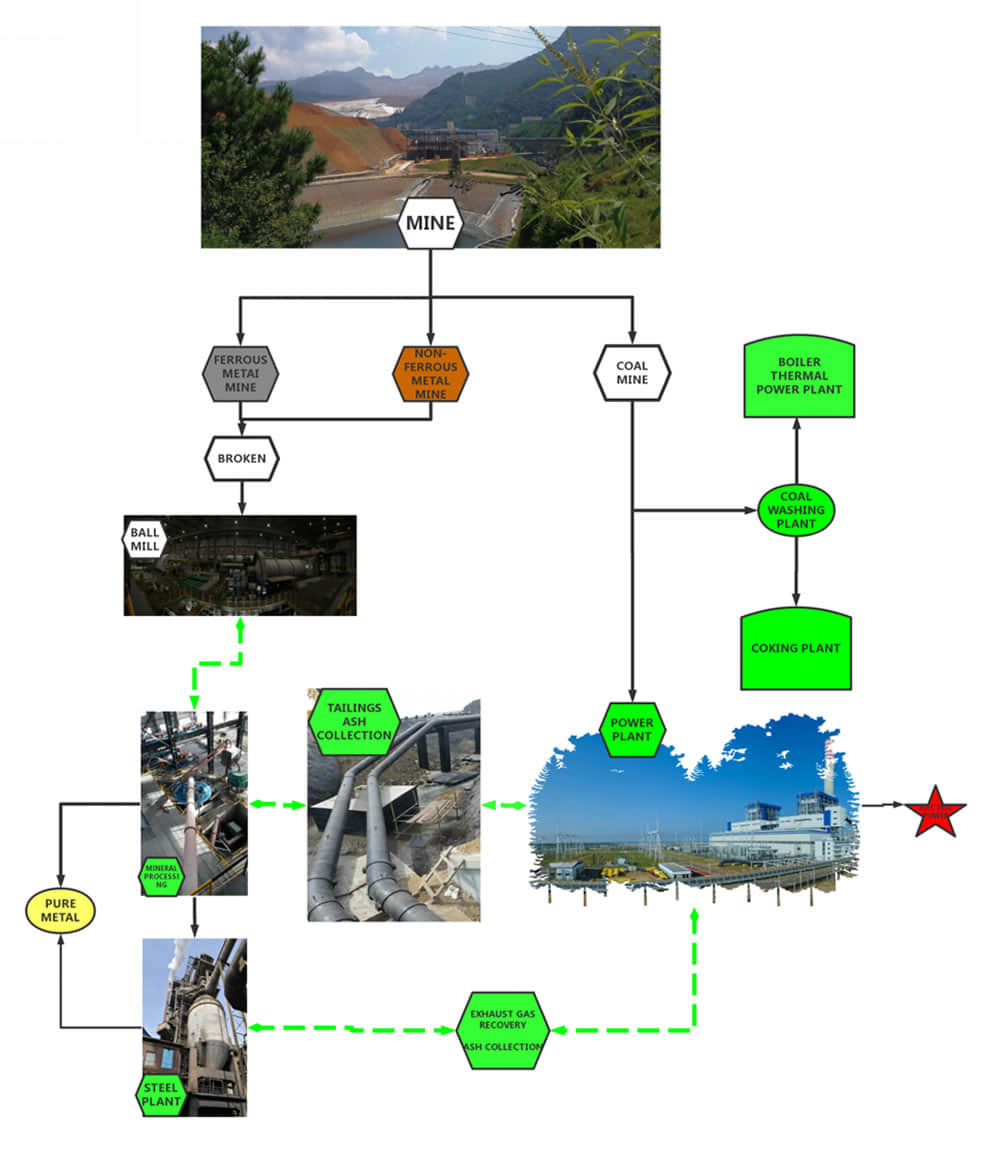
Cast basalt pipe is a kind of silicate crystalline material that has been produced and processed. It uses natural rock (basalt, diabase and other basic rocks) or some industrial waste slag as the main raw material. After melting, pouring, crystallization and annealing and other processes. Cast stone has excellent wear resistance and corrosion resistance. Cast stone products mainly include cast stone slabs, cast stone pipes, cast basalt lined pipes, jacketed cast stone pipes, cast stone wear-resistant expansion joints, cast stone wear-resistant valves, cast stone powder and various wear-resistant and resistant cast stone powders as raw materials. Putty slime, etc. Has been widely used in electric power, mining, coal, metallurgy, chemical, construction and other industrial sectors severely worn and corroded parts and equipment.
the cast basalt lined pipe is composed of the inner lined cast stone pipe, the outer steel pipe and the cement mortar filling layer between the two. It integrates the wear resistance and corrosion resistance of the cast stone pipe, the toughness of the steel pipe and the consolidation of the cement mortar. In one. It improves the adaptability of the Product to various complex working conditions. At the same time, the use of cement mortar as a filler can make the inner surface of the steel pipe in an alkaline medium, and the surface of the steel pipe will produce a purification film, which can prevent corrosion. It is resistant to wear, corrosion, and high pressure, and is safe and convenient to transport.
Cast basalt lined pipes are divided into straight pipes, curved pipes, tee (cross) pipes, reducing pipes, etc.
The diameter series of the cast stone composite elbow is the same as that of the cast stone composite straight tube, and its turning radius and center angle are made according to user requirements.
Non-standard specifications of cast basalt lined pipes can be made according to customer’s technical requirements. For large-diameter cast basalt lined pipes with a nominal diameter of more than 800mm, different cements are usually used to paste the cast stone plates on the inner wall of the well-processed steel pipes according to the operating conditions of the pipe fittings to form an integrated cast basalt lined pipe. Its advantages are good wear resistance, wide application range, small size limitation of pipe fittings, and low cost of pipe fittings.
Natural gas is used for melting basalt stone in melting furnace. Natural gas is currently very clean and environmentally friendly fuel. No any pollution. To the customer requirements choose environmental protection material that is a good choice.
The product processed from cast basalt is a new type of silicate crystalline material. Using natural rock (basic database, shale, etc.) or industrial waste as the main raw material components, smelting, casting, heat treatment and other processes are regularly arranged, crystalline, hard, and fine-textured metal industrial materials. Casting basalt has an excellent high abrasion and high resistance. Abrasiveness. Corrosion resistance.
Lorem ipsum dolor sit amet, consectetur adipiscing elit. Sed ultrices elit eget sem luctus interdum. Morbi a sapien ut dolor placerat consequat. Nulla facilisi. Vivamus at lacinia elit. Phasellus at faucibus lacus. Duis in enim pharetra, lobortis neque id, ultricies sapien. Sed finibus, arcu vitae suscipit vehicula, purus lectus vestibulum tortor, vel semper justo erat eu risus. Nulla ac odio ac turpis blandit porttitor vitae vitae metus. Fusce commodo lacinia leo quis dictum.
Friction Resistance – As more material is passed over Cast Basalt it gets polished up thereby reducing friction further. Cast Basalt improves in service after getting polished. Wetting also improves its performance in practical applications.
Impact Resistance – Direct Impact Resistance at 90 degree is low like all other ceramics, but it can be increased with proper installation by reducing the angle of impact. Cast Basalt is the best wherever sliding abrasion exists. Moreover, external impact strength of composite basalt pipe (enclosed in M.S. Shell) is always more than that of bare Ni-hard Pipe.
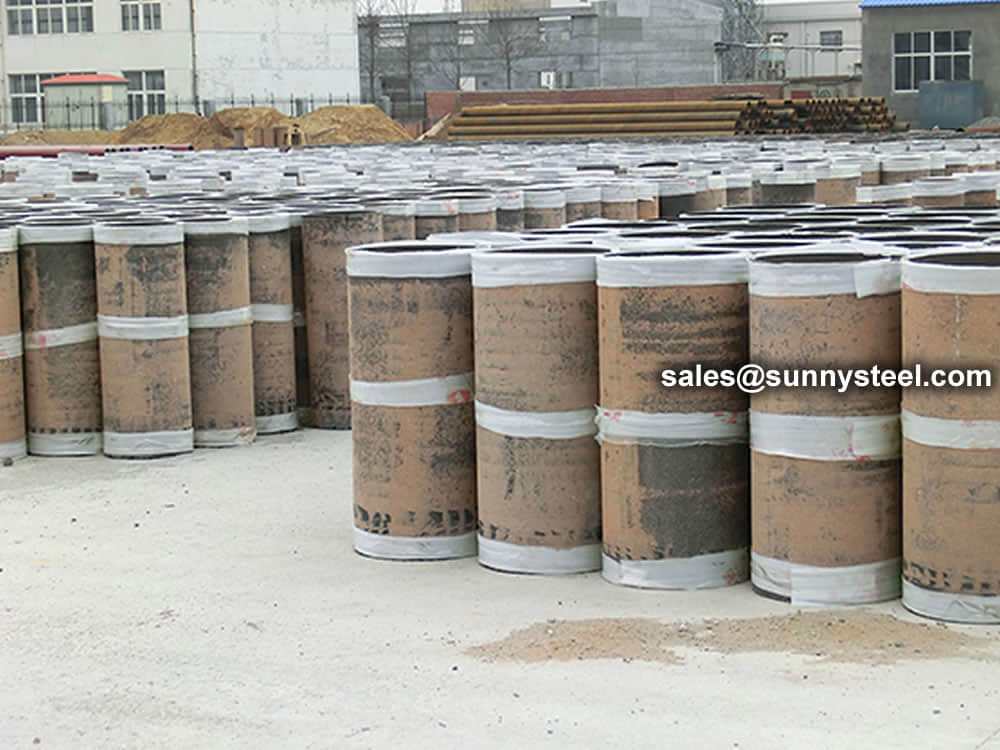
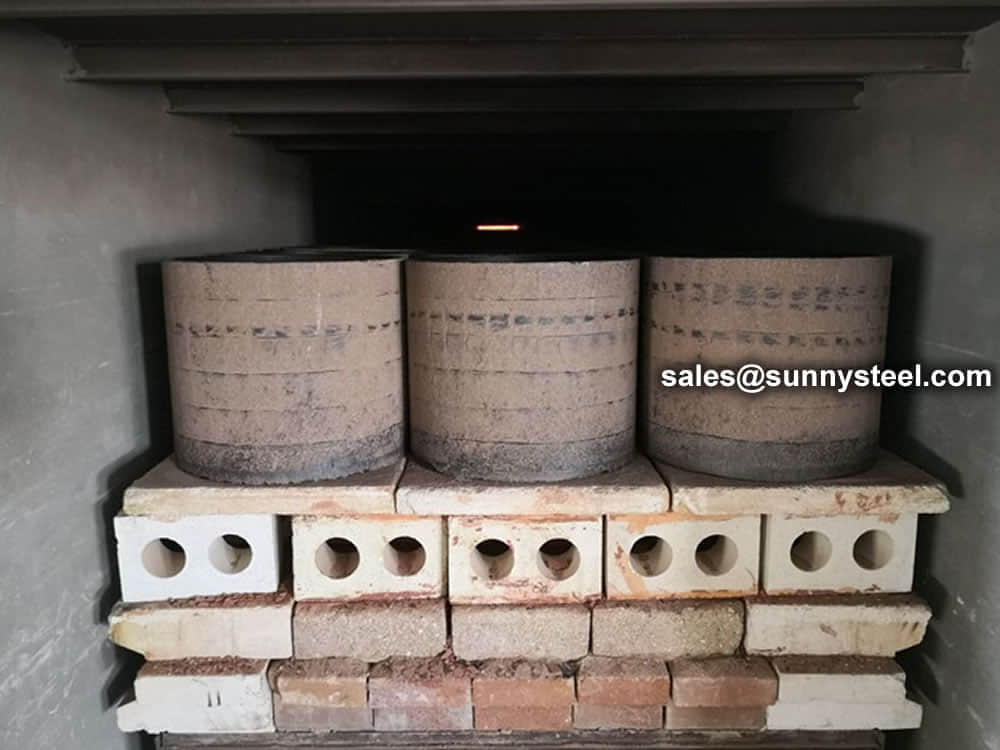
Chemical Resistance Cast Basalt is almost absolutely acid/alkali resistant (except Hydrofluoric Acid) and hence corrosion resistant.
Weight and Sizes - Basalt Tiles are available in regular shape square of 200 x 200 x 30 mm thick, weighing approx. 90 kg/sq m; whereas bends and pipes are lined using Basalt

